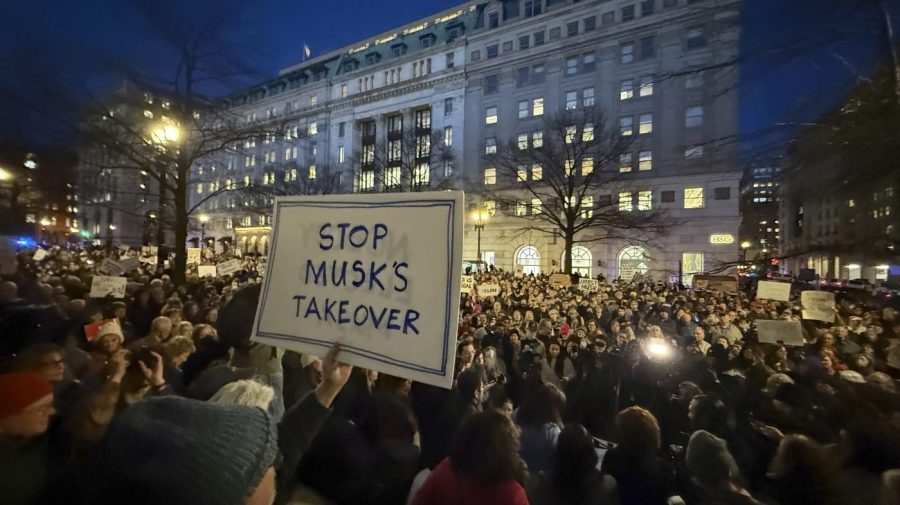
No matter how you look at it, President Trump is delivering. Depending on which side of the fence you sit on, he is either slashing the budget and saving taxpayers billions or hellbent on retribution, ruining the lives of civil servants and weakening the U.S. abroad. Like most things in life, the political reality is a little of both.
What Trump is doing is eerily similar to what Warren G. Harding did when he entered office more than 100 years ago. Like Trump, Harding was an America First candidate who supported protective tariffs, cutting spending and supply-side economics. The country was drowning in war debt and executive leadership was absent, as President Wilson had suffered a stroke in his last year in office. The public was largely in the dark about his competency.
Sounds familiar, doesn’t it?
America has long had a spending problem, which has resulted in debt and corruption. In retribution, President Trump signed an executive order to create the Department of Government Efficacy to reduce waste, cut regulations and improve efficiency. He tapped campaign supporter and billionaire Elon Musk to lead the way.
In doing so, Trump has centralized authority in an individual with significant conflicts of interest. In the backlash, there have been several attempts to check the power of Elon and DOGE.
Let’s say they overcome the challenges and succeed — what then? Regardless of party, most Americans feel the government spends too much and is unaccountable to the people. If Trump and Musk want to make lasting change to remedy the problem and avoid legal challenges, they should lobby Congress to create a new budget process instead of an executive band-aid fix.
Harding, like Trump, entered office after years of expanding government. Progressive-era reforms expanded the executive branch, creating the Food and Drug Administration, Federal Trade Commission and Federal Reserve System. Congress had no formal budgeting process at the time, leading to a “chaotic” financial system that produced waste, extravagance and inefficiency.
Once in office, Harding immediately called a special session of Congress. He tapped Andrew Mellon, one of the richest men in America, to head the Treasury. Mellon then lobbied Congress to pass the Budget and Accounting Act of 1921. The act created a new Bureau of the Budget (now the Office of Management and Budget) to review the federal budget, and centralized the budget preparation under the executive branch. To head the new bureau was Charles G. Dawes, who slashed around $350,000,000 from the budget in the first fiscal year.
Just as Harding recognized the need for reform during a period of financial chaos, today we face similar challenges, with an expanding executive branch and insufficient congressional oversight.
Of course, the budget process has evolved since the Harding administration. The first evolution established the framework and required the president to submit an annual budget to Congress, with the Bureau of the Budget facilitating it. The Congressional Budget and Impoundment Control Act of 1974 gave Congress a more active role in budgeting, including creating a budget resolution to guide spending decisions.
However, the continuing growth of the executive branch and the stagnation of Congress have made proper oversight and review difficult. “More than 68 percent of America’s spending is on AUTOPAY with no Congressional review or renewal required,” according to the Senate Budget Committee. Trump and Congress should champion this issue and use current media attention to move the needle, and consider creating a congressional review committee to tackle spending.
In order to carry such a review out effectively, though, Congress must increase its capacity. Expanding the House of Representatives would improve oversight and accountability by involving a broader range of perspectives and creating smaller, specialized committees to focus on spending details. This would allow for more in-depth scrutiny of the budget, ensure taxpayer money is better allocated, and reduce the potential for waste. A larger House could also enhance transparency and improve the overall budgeting process, offering a stronger check on executive power and making government spending more democratic and efficient.
While DOGE aims to centralize authority, a new budget process that includes expanding the House would distribute responsibility and improve oversight, ensuring that any fiscal reforms have a strong democratic foundation. Trump could deliver lasting change, by returning power back to the people where it belongs.
Jeff Mayhugh is the founding editor of Politics and Parenting and vice president at No Cap Fund.












